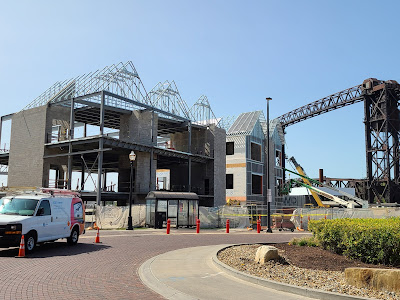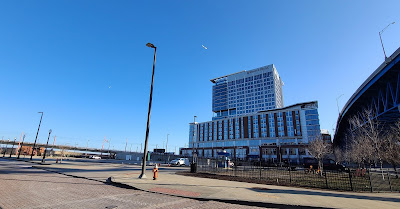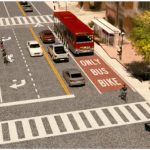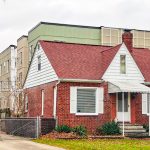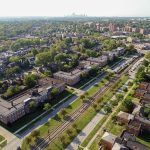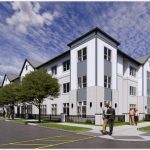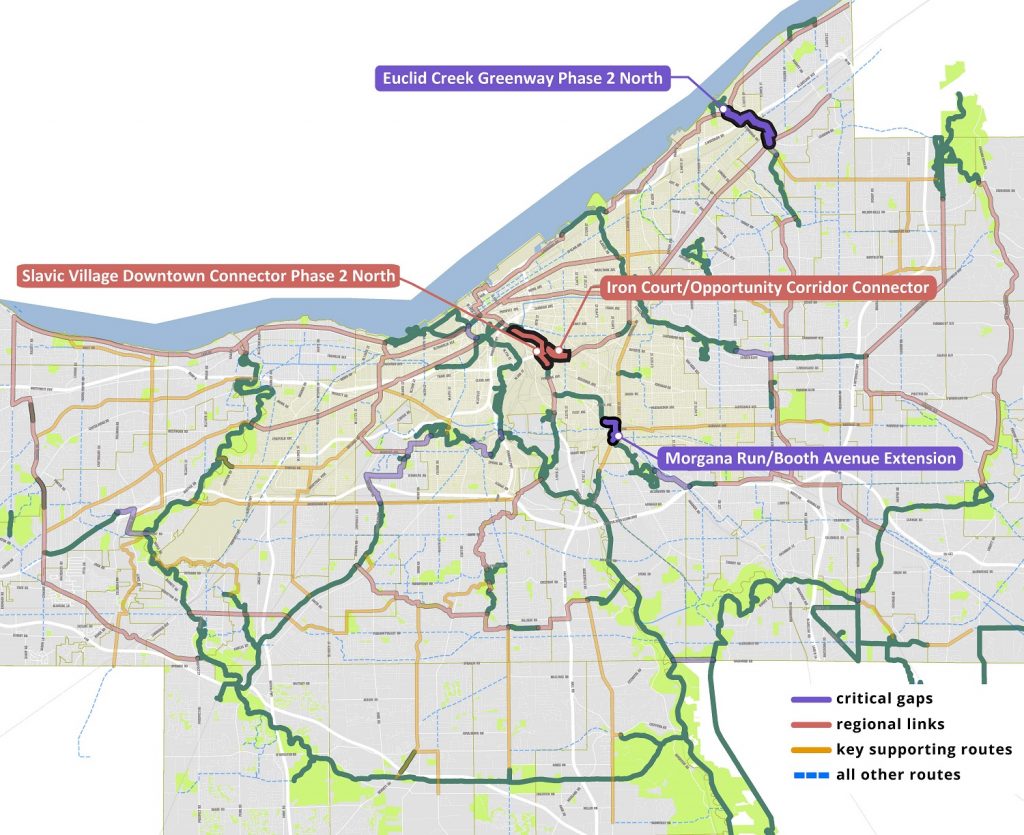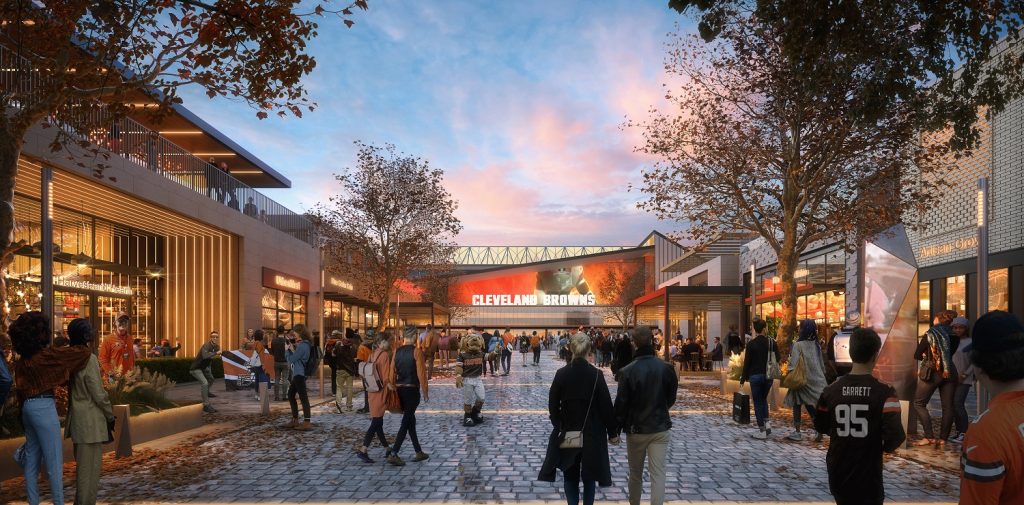In addition to a spate of high-rise developments on the horizon, there are also new low- to mid-rise developments just around the corner, too. One of them is a project that was originally proposed to be a mid- to high-rise building.
Instead, a mixed-use building representing the first salvo for the second half of the Flats East Bank development will be reduced from 11 or 12 stories down to seven or eight stories. And, as NEOtrans learned this week, its construction timeline will be pushed back by about five or six months.
Called Kenect Cleveland, this component that previously featured 325 micro-unit apartments, 25,000 square feet of co-working space, 22,000 square feet of ground-floor retail and a parking structure had already lost its planned multi-screen cinema due to a declining movie theater industry.
Kenect Cleveland developer Akara Partners CEO Rajen Shastri confirmed in a March 2 e-mail that its portion of the project will “no longer (be) above six stories.” Kenect is a brand name prefix for multiple developments in multiple cities by Akara Partners of Chicago.
| Site plan of Flats East Bank showing the second half of the pro- posed development, featuring up to 2,000 new residential plus tens of thousands of square feet of commercial space (HSB). |
Scott Wolstein, CEO of the Wolstein Group and a partner in the project with Akara, clarified that Akara’s six-story structure will be built above a podium. The podium of retail and restaurant spaces apparently is the responsibility of Wolstein. He would not elaborate on each partner’s roles in the joint venture, however.
But the construction style is no secret. Typically, in a new, mixed-use, mid-rise building in Cleveland, the first story or two is built from reinforced concrete and accommodates commercial uses such as retail or restaurants. Above it is usually a stick-built (ie: wood-framed) apartment building.
That combination provides for a strong, mid-rise structure that is financially feasible to build in Cleveland’s low-rent, high-construction-cost market.
A shorter building may mean fewer housing units or retail spaces, unless they spread northward into the area where the movie theater was planned. But Wolstein said those details have yet to be ironed out.
| A conceptual image of the next planned building for Flats East Bank. This concept has already changed. Instead it will be less tall and possibly spread out more evenly on the site (HSB). |
“We are not prepared to get into that level of detail,” he said. “It will all be in the public domain when we submit plans to the city for permits.”
In December, Cleveland City Council extended by 30 years an existing 30-year Tax Increment Financing (TIF) arrangement for the Flats East Bank development that began a decade ago. That will let Wolstein’s Flats East Bank affiliates forego non-school property taxes on the 23-acre parcel until 2071.
It will also allow Wolstein to refinance an existing $30 million loan from the federal Department of Housing & Urban Development (HUD), thereby reducing his payments and freeing up cash for the next phase of development.
After the city extended the TIF, Akara acquired the 2.45-acre property for the next phase, bounded by West 10th and 11th streets, Front Street and Main Avenue for $6.1 million, county records show. At about the same time, Wolstein and Akara’s Shastri said they had hoped to break ground on their mixed-use building in June.
“HUD will take longer than June unfortunately and (so we’re) probably looking at year end,” Shastri said in his e-mail.
The first phase of the Flats East Bank development, valued at $275 million, consisted of a 23-story, 480,000 square foot office tower that’s 95 percent leased, an eight-story, 150-room Aloft Hotel and 30,000 square foot of restaurant and retail space. It was completed in 2013.
In 2016, the second phase was finished, totaling $146 million not including boardwalks, streets and other infrastructure. This phase featured an eight-story, 240-unit apartment building with 100,000 square feet of ground-floor retail and restaurant space. The apartments are more than 80 percent full and all of the restaurant/retail spaces are leased.
The first two phases were a joint venture of the Wolstein Group and Fairmount Properties. Fairmount sold its interest in Flats East Bank in 2018. Soon thereafter, Akara Partners entered the picture.
Later phases of Flats East Bank could total nearly 2,000 residential units and tens of thousands of square feet of commercial space including co-working spaces, retail and restaurants. Each new phase of development would be added based on demand and market conditions. In total, it could be valued at about $550 million, Wolstein said.
Total value of investment by Wolstein and his original Flats partner, the Fairmount Properties, in the first half of Flats East Bank totaled nearly $500 million. Combined with the second half of development, the total investment in the Flats East Bank could exceed $1 billion.
The long-range plans were revealed last October during Downtown Cleveland Alliance’s Episode 22 of its “Downtown Now!” Webinar and first reported on by NEOtrans. In his presentation, Wolstein described the growing market for the massive, long-term development plan.
“I have four millennial children,” he said. “It was in vogue for children of that age to pick up their roots to go Chicago, New York, San Francisco and so forth. I think we’ve gotten to the point where people are giving a second look to Cleveland: ‘You know what, I really don’t need to leave. I can live here and make a good life in Cleveland.'”
END

